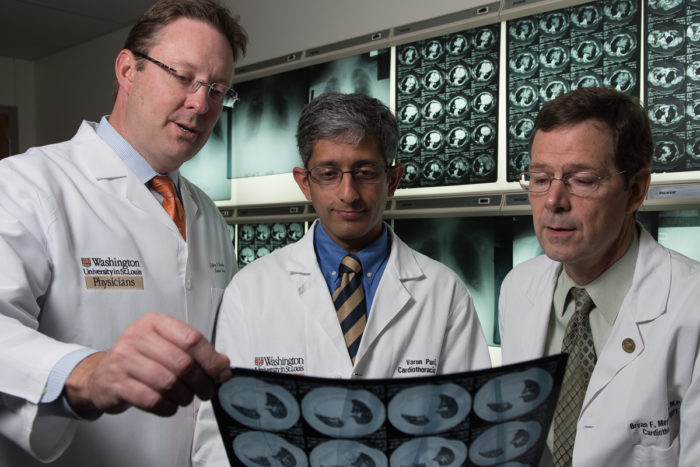Training programs strengthen physicians’ clinical research expertise
Washington University School of Medicine offers physicians the opportunity to participate in clinical research and outcomes training programs

Varun Puri, MD (center) is learning about clinical investigation as part of Washington University’s clinical research training program. Image courtesy of Tim Parker.
The growing movement to measure and improve patient safety and outcomes has created a need for clinical investigators who are experts in areas such as biostatistics and comparative effectiveness. At Washington University School of Medicine, thoracic surgeons are among the many physicians who are now active in this field and have advanced their own training through programs at the medical school.
Varun Puri, MD, a Washington University thoracic surgeon at Barnes-Jewish Hospital who has studied the effectiveness and cost of treatments for clinical stage 1 lung cancer, is enrolled in the Master of Science in Clinical Investigation Program offered through the Clinical Research Training Center at Washington University.
“Being interested in patient-related outcomes at the clinical level, I thought the most effective way to study that would be to start at an institutional level and then expand my studies to larger national databases,” says Puri.
About halfway through the program, Puri has found courses in statistics, risk factor analysis and predictive modeling to be the most helpful. These topics relate to current research as Puri develops risk models to predict long-term survival and long-term cancer-free survival rates in patients with early-stage lung cancer.
Designing clinical outcomes research
A fellow Washington University thoracic surgeon, Stephen Broderick, MD, has turned to the Master of Population Health Sciences (MPHS) Program–offered by the Department of Surgery’s Division of Public Health Sciences–to enhance his skills in outcomes research and quality of life studies.
The MPHS Program equips clinicians and clinical doctorates with the advanced research methods skills needed to design clinical outcomes research, interpret results and apply findings to improve clinical effectiveness. Broderick has found a course in shared medical decision-making to be especially helpful; in a current clinical trial, he is using validated scales to measure quality of life in patients with early stage lung cancer.
Bryan Meyers, MD, MPH, chief of thoracic surgery at Barnes-Jewish Hospital and the Patrick and Joy Williamson Professor of Surgery, earned a master of public health at Saint Louis University; he is supportive of the advanced training his colleagues Puri and Broderick pursue. “They are learning skills that they will carry through their careers and that they can teach to residents and fellows,” he says.






